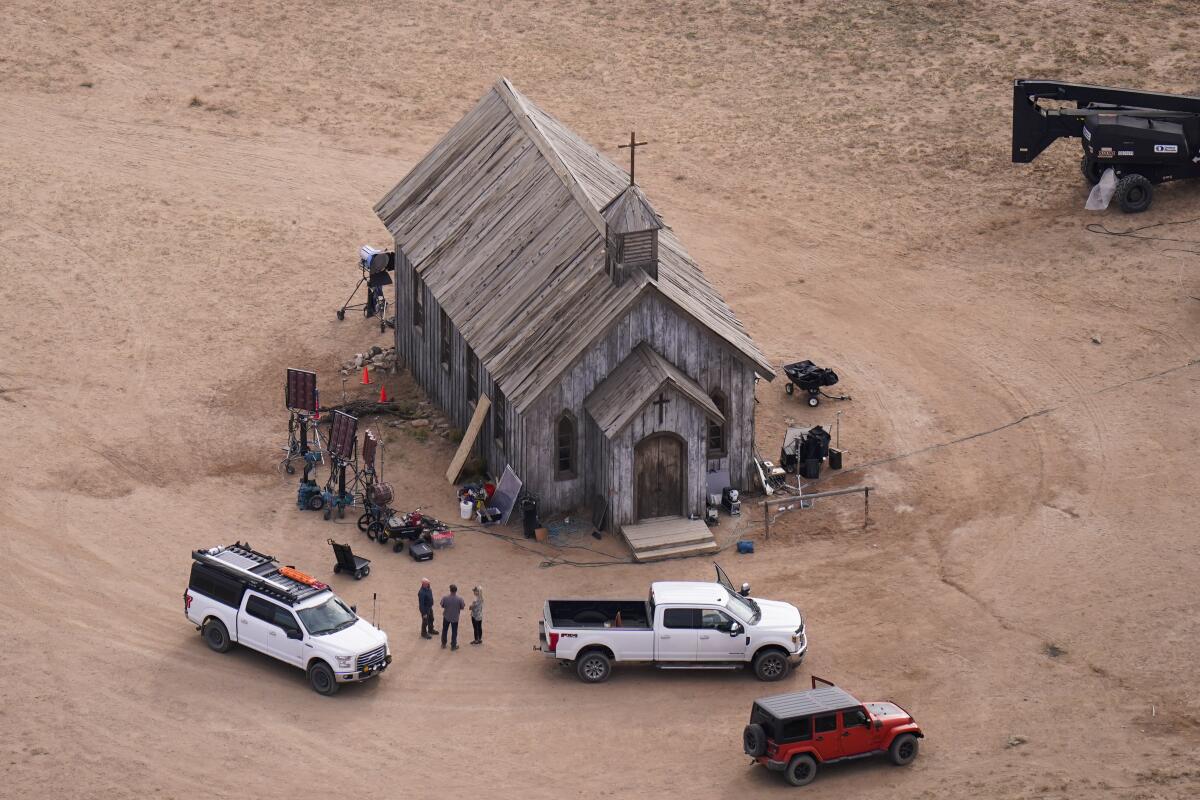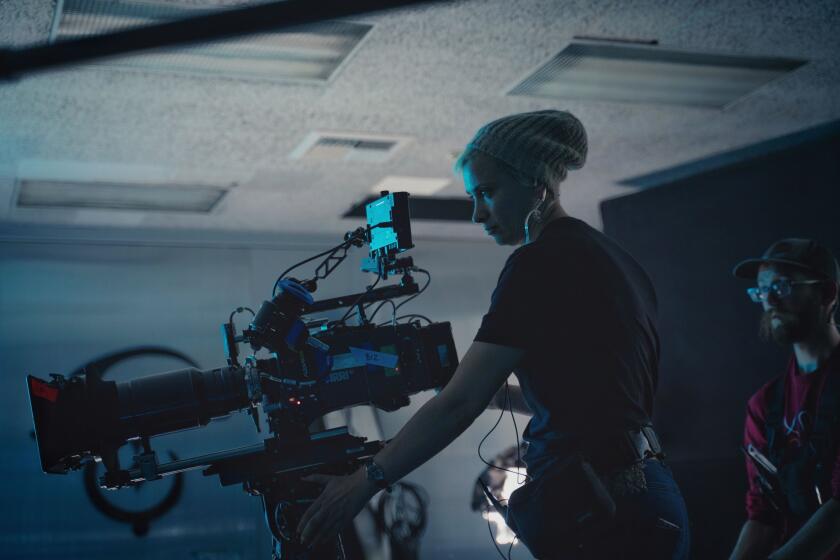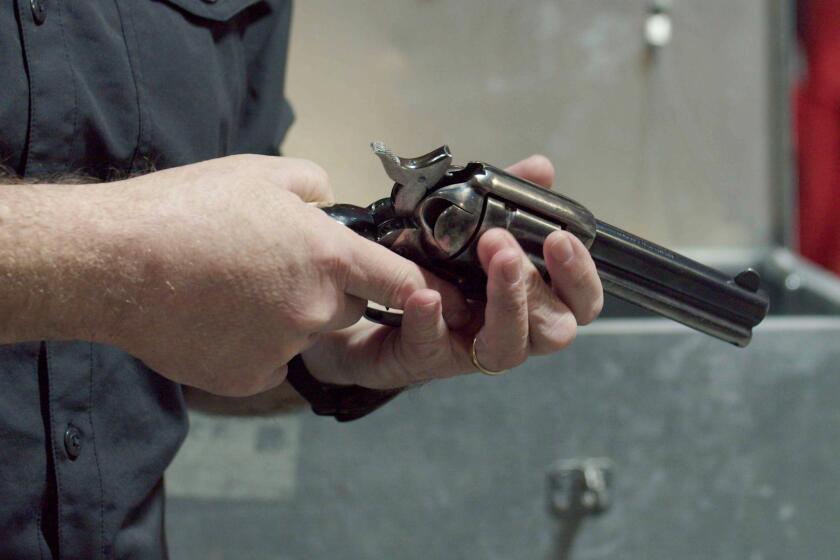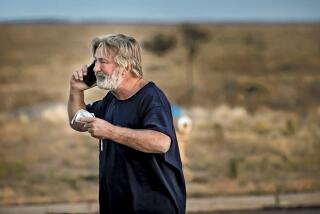Hollywood’s broken promises to make sets safer after deadly ‘Rust’ shooting

In February, the family of Sarah Jones scattered her ashes in the Appalachian Mountains to mark the eight years since she was killed on a Georgia movie set.
The popular camera assistant was hit by a train during filming on a historic trestle, which the railway operator hadn’t approved. For her father Richard, the sadness of losing his daughter in a preventable accident was deepened by another more recent tragedy: the killing of cinematographer Halyna Hutchins on the western “Rust,” outside of Santa Fe, N.M.
“The first thing I thought [was] we had failed our mission. We’ve got to do a better job,” Jones said. That weekend he called for the formation of a film and TV industry coalition to address a lack of consequences and enforcement of safety protocols.
Like Jones’ death, the Hutchins fatality shook the industry to its core and prompted widespread calls for reforms and safer sets in emotional memorials in Santa Fe and Burbank. But a year after actor Alec Baldwin shot and killed Hutchins and injured the film’s director Joel Souza, little has changed for safety procedures involving guns on sets nationwide, according to interviews with several crew members and union officials.
While several productions said they would no longer use real guns on sets, calls to ban firearms went nowhere.
Legislation to add safety monitors on California sets has yet to make it through Sacramento. And so far, unions and studios have not announced any new training or safety initiatives to prevent other accidental discharges on productions.
“I’ve seen foot dragging,” said New Mexico-based armorer Scott Rasmussen and a member of IATSE Local 480. “I’ve tried to get my union here to be proactive and to set forth a training program to certify people to be armorers since January. I have not been contacted by anybody about it. I’ve not seen in any of our newsletters any reference to any such thing. I’m frustrated.”
Rasmussen turned down the job on “Rust” to be both armorer and prop master because he was concerned that the role was stretched too thin.
Since the accident, Rasmussen said he is seeing a shift in his state to using airsoft guns over real guns. He has worked on only one production in the last year, the upcoming film “Bad Hombres,” starring Thomas Jane and Luke Hemsworth, where real weapons were used.

He is aware of courses provided by his union for crew to familiarize themselves with guns since the tragedy, but he wants to see more. “I have tried to get licensing for armorers in the state and the union has just stonewalled,” Rasmussen said in an interview.
Representatives for Local 480, which is the local union for crew in New Mexico, did not respond to requests for comment. At the time of the accident, Local 480 said it had been “greatly disturbed” by reports the production had hired nonunion crew and was cooperating with authorities.
To be sure, Hollywood was quick to denounce what happened on “Rust.” And several shows, including ABC’s “The Rookie” and Amazon’s “The Boys,” pledged to replace real guns on their shows with fake guns with visual effects muzzle flashes. Even Dwayne Johnson vowed to no longer use real guns in his future projects.
The use of so-called non-guns, which use an electric charge to fire rather than explosives, has also been on the rise.
The producers and other crew members of “Rust” have already been hit with several lawsuits that allege negligence and breaching of industry safety protocols.
Cinematographer Halyna Hutchins was killed on the set of “Rust” in October 2021. A judge dismissed the involuntary manslaughter case against star Alec Baldwin in July 2024.
“There were a number of industry standards that were not practiced and there’s multiple responsible parties,” Matthew Hutchins, the cinematographer’s husband, told NBC earlier this year. When filing a wrongful death suit in February, Hutchins and his attorneys alleged Baldwin and other members of the production breached several industry safety measures. Baldwin has denied any wrongdoing.
Earlier this month, the Hutchins family and the “Rust” production, including Baldwin, reached an undisclosed settlement in the suit, calling her death a “terrible accident.”
The producers are planning to resume filming early next year outside of New Mexico, although it’s not clear where and whether they will be able to do so given a pending criminal investigation.
Rust Movie Productions LLC has said that the safety of its cast and crew was a top priority, that it was not made aware of any official complaints concerning weapon or prop safety on set and that it was cooperating with Santa Fe authorities on their criminal probe.
New Mexico’s First Judicial Dist. Atty. Mary Carmack-Altwies said earlier this month that as many as four people could face criminal charges in connection with the accident, including Baldwin.
In reaction to the tragedy, politicians in multiple states called for legislation to restrict gun use on film sets.
Among them was California state Sen. Dave Cortese (D-San Jose), who said last October that he wanted to ban live ammunition and firearms on film and theatrical sets. But the measure died amid industry opposition.
Some armorers had called the push to ban guns “misguided,” saying it would threaten their livelihoods and encourage productions to flee the state in favor of more gun-friendly regions.
Cortese’s bill, SB 831, stopped short of prohibiting the use of real guns or bullets, but it had the support of the industry’s unions.
It would have bolstered the requirements for filmmakers wanting to use real guns with blanks. Studios would need to hire a set safety supervisor separate from the crew, as well as a qualified armorer or prop master, ensure sufficient staffing and provide gun safety training for anyone in close proximity to the weapons.
“We have lost members due to train accidents, fatigue-caused car accidents, and other incidents as a result of a culture that often prioritizes production goals over workers’ safety,” IATSE said in support of the bill. “To address this, we have researched safety practices around the globe and determined the best practice is to require a safety supervisor to conduct a thorough pre-production risk assessment and to be present every day and responsible for ensuring on-set safety.”
IATSE declined to comment further for this story.
The bill ultimately faltered when unions couldn’t agree on a compromise with Hollywood studios who backed a narrower, rival bill introduced by California state Sen. Anthony Portantino (D-La Cañada Flintridge).
Despite negotiations this summer between the unions and the Motion Picture Assn., the legislative session ended without agreement.
In a statement, entertainment industry unions said they could not get Hollywood studios to support “significant, meaningful and practical safety reforms.”
In New Mexico, where lucrative tax incentives lure productions like “Rust,” Gov. Michelle Lujan Grisham told the L.A Times she was considering introducing new regulations on firearms and other aspects of production in the wake of what happened on “Rust,” potentially through legislation. But so far, no new laws or regulations have been introduced in the state.
“While robust safety procedures are currently in place regarding the use of guns in production, we will continue to monitor the findings of the ongoing investigations into the events on the Rust set and evaluate the need for potential further action,” Dolores Martinez, a spokesperson for Film New Mexico, said in a statement.
An industrywide labor-management committee, composed of union and studio representatives, is weighing revisions to safety bulletins governing the use of guns on sets, such as requiring armorers to be present when weapons are handed over to actors. But it is too early to know whether any changes will be made.
The rules governing how guns are used on film and TV sets are being revised in the wake of the ‘Rust’ shooting.
Critics say Hollywood unions could do more.
Frustrated members of Local 480 in New Mexico criticized the local for not keeping up with the surging demand for production that has led to rising labor tensions and complaints of safety problems on sets.
“Why did this happen? It’s because Hollywood can’t police itself,” said Lara Dale, a Foley artist, actor and founder of the New Mexico-based Safe Sets Initiative. She is not a union member. “The union should have stepped in and she’d [Hutchins] be alive.”
Dale said the Occupational Safety and Health Administration (OSHA) needs a film unit that could shut movie sets down in cases like “Rust,” where safety concerns led to a crew walkout. “OSHA could have come in that morning and said, ‘This is an unsafe set; we’re putting a lock on it,’” Dale said.
While OSHA does not have a film unit, it is planning to contact film industry employers, workers and union representatives “so they know how to seek assistance and/or anonymously report unsafe work conditions,” said Matthew Maez, a spokesperson for the New Mexico Environment Department.
New Mexico’s workplace health and safety unit levied its maximum fine against the production, alleging managers “demonstrated plain indifference” to employee safety. Rust Movie Productions contested the fine and denied wrongdoing.
Union safety representatives were always present on set, Rust Movie Productions said in its appeal.
In a statement posted online in April, IATSE Local 480 said it supported the OSHA report on the “Rust” incident.
“We are proud to support the existing industry rules that keep us workers safe on set,” the union said. “We hope this report can bring some relief and comfort to the Hutchins family.”
Earlier this year, the Directors Guild of America said it was forming a new committee that will recommend and advance various safety measures.
But some members have pressed the union to do more, calling on the leadership to create a code of conduct that would catch repeat offenders of safety protocols.
L.A.-based director Regina Ainsworth said she pitched the concept as a way to track breaches of safety protocols after it emerged in 2020 that Randall Miller, the director of “Midnight Rider,” on which Sarah Jones died, was back directing with the guild’s approval.
“Some people died under his watch, why does he get to continue making films? That’s a particularly tough pill to swallow,” Ainsworth said in an interview earlier this year.
The DGA suspended Miller for one year after he was found guilty of the involuntary manslaughter of Jones, and later reinstated him, according to Georgia court records.
Hairstylist Joyce Gilliard, who was among those injured with Sarah Jones, wants unions to do more.
“They should have different things in place so when something happens, people can be reprimanded in the unions ... because people are getting away with a lot on set,” Gilliard, who has been in the industry for 15 years, said. “It’s mind-boggling for me.”
After Jones’ death, Gilliard founded iSAFE!, an organization to promote safety on sets.
“I just want everyone to just get out of their mind-set that they can’t speak up,” she said.
More to Read
Inside the business of entertainment
The Wide Shot brings you news, analysis and insights on everything from streaming wars to production — and what it all means for the future.
You may occasionally receive promotional content from the Los Angeles Times.













